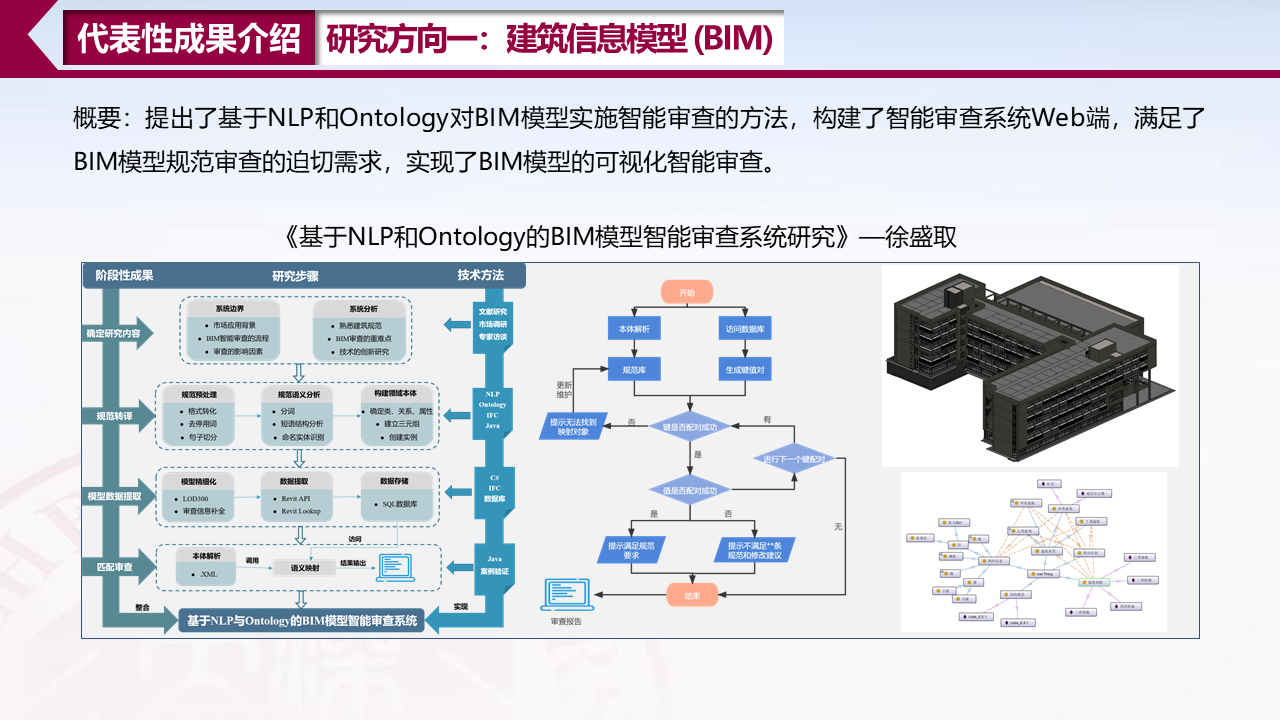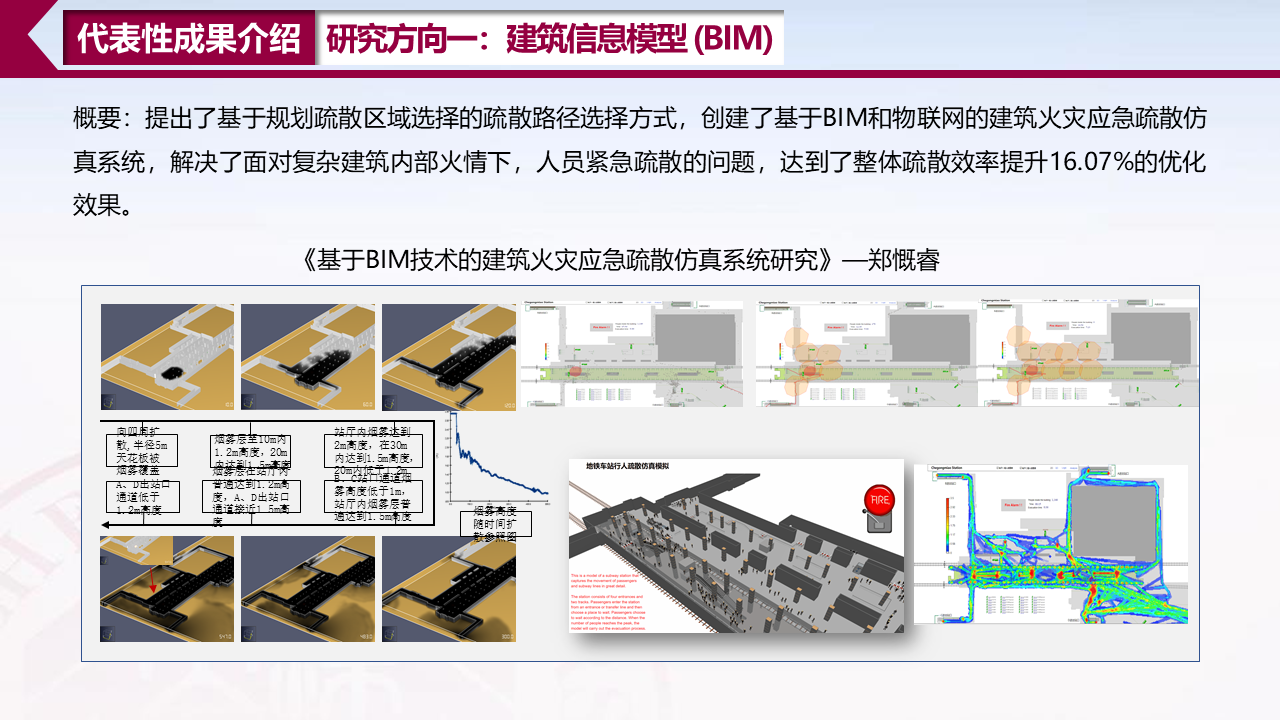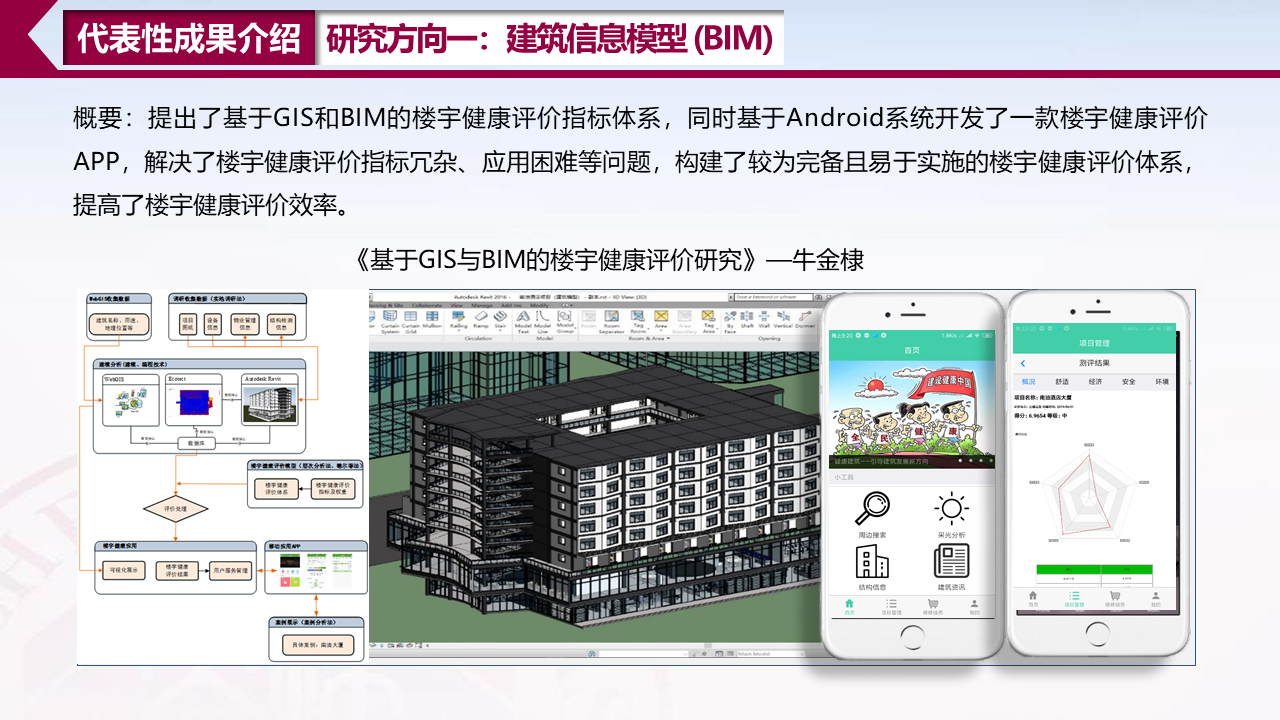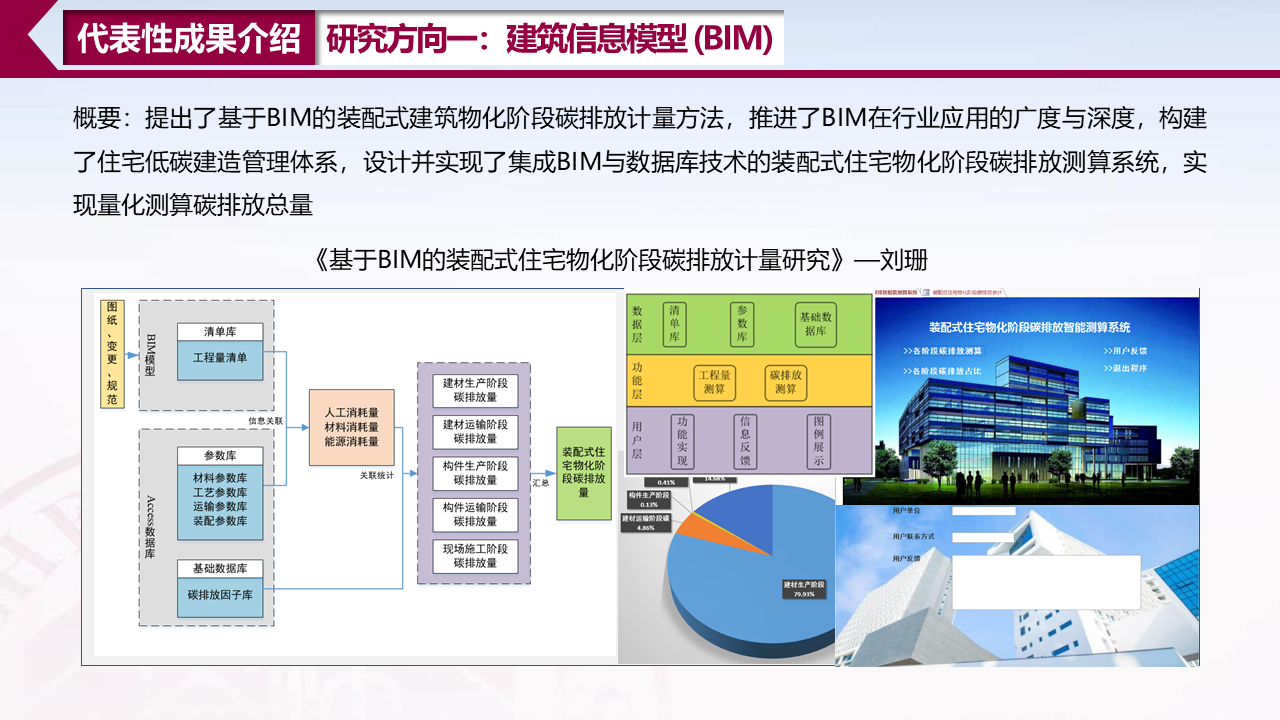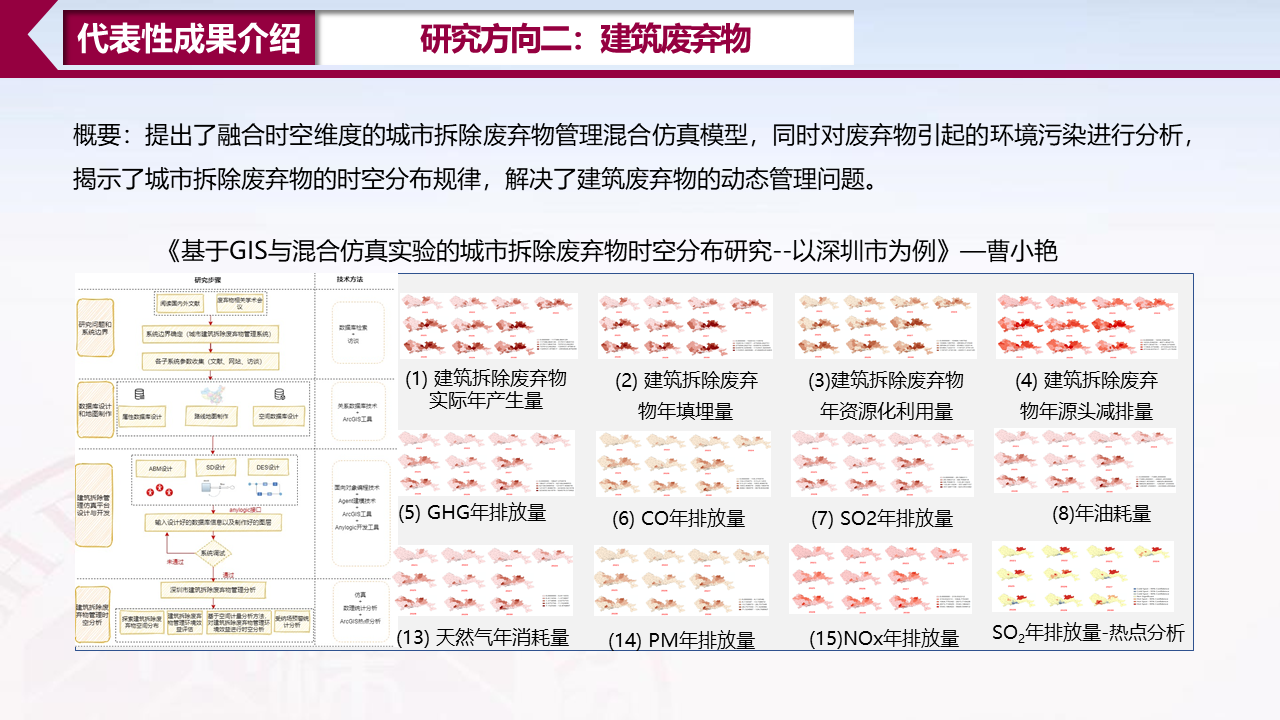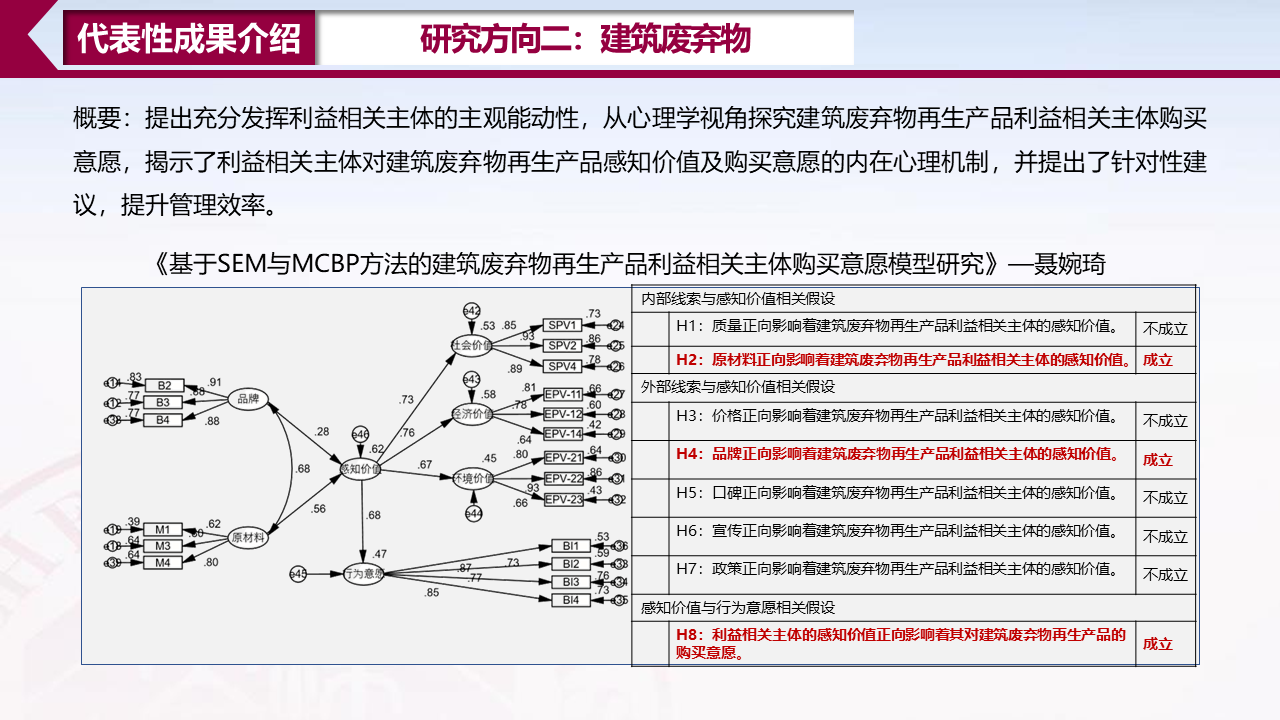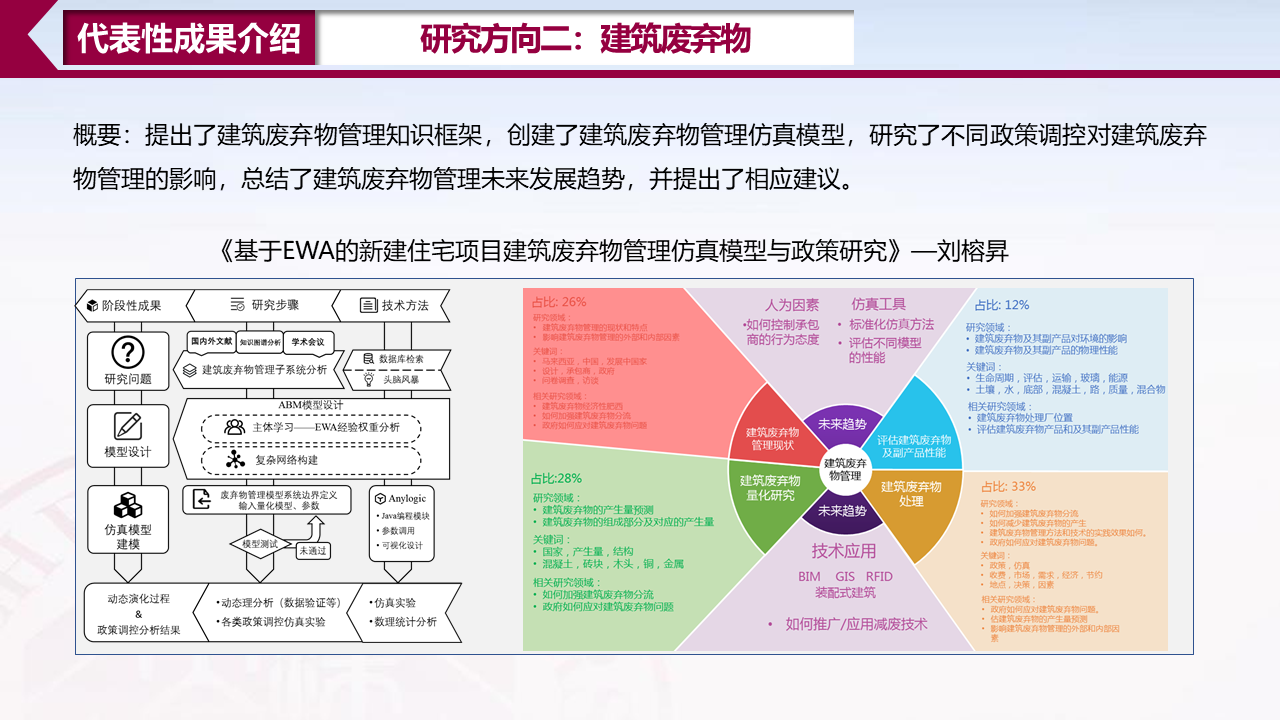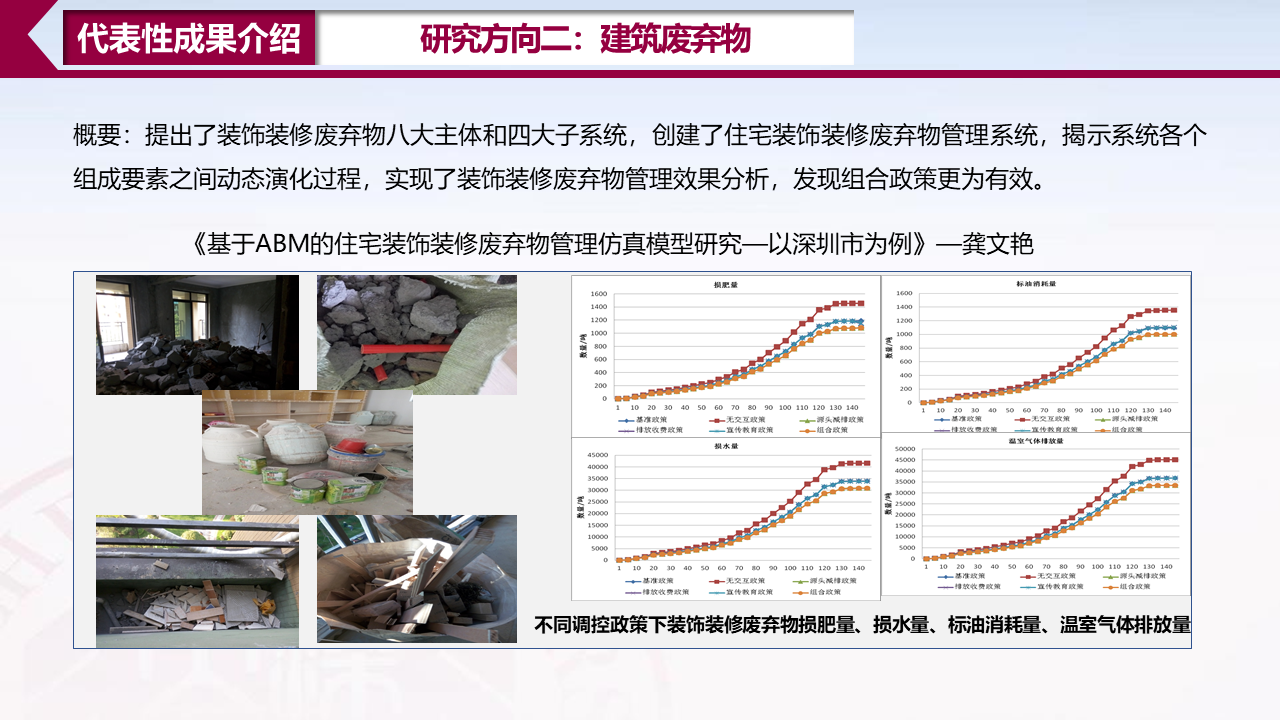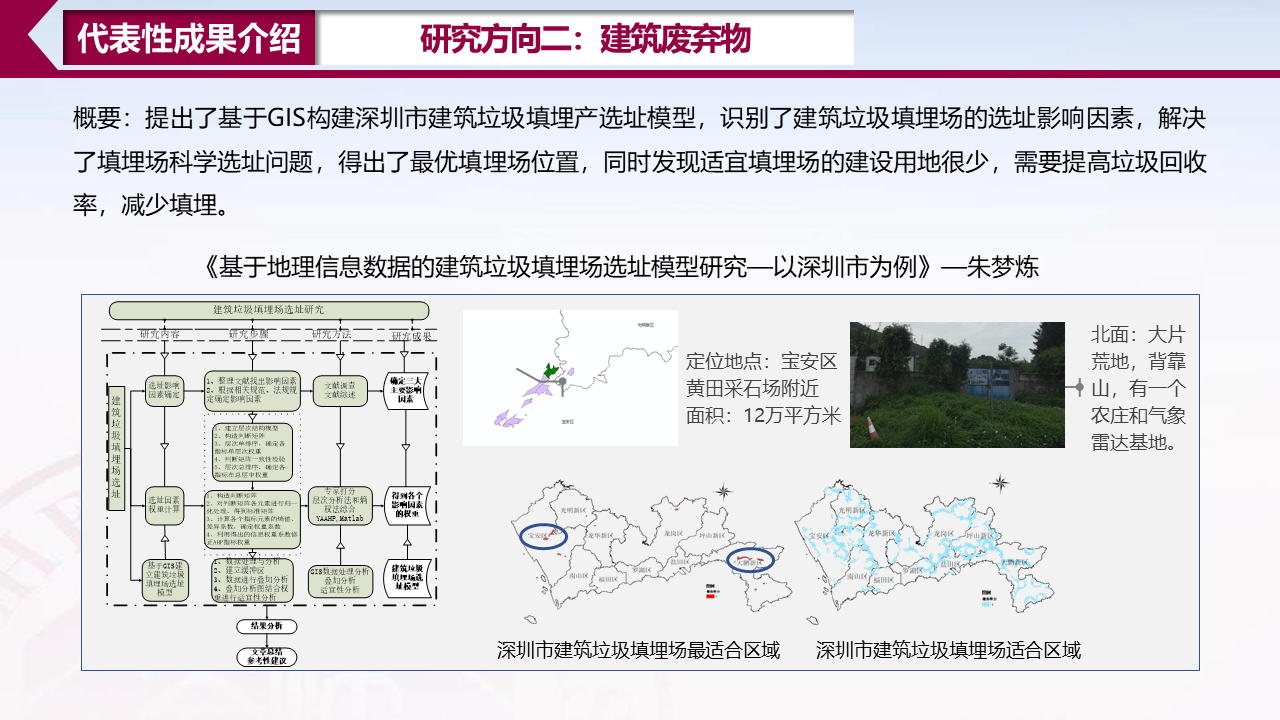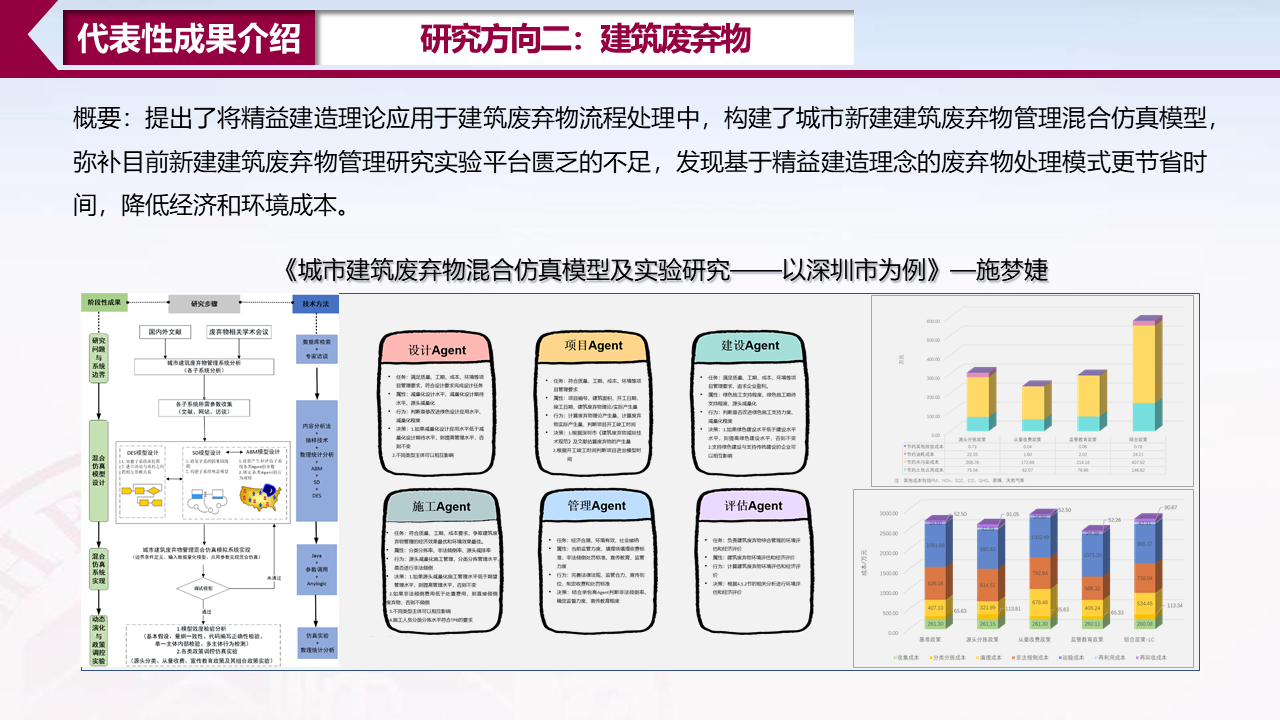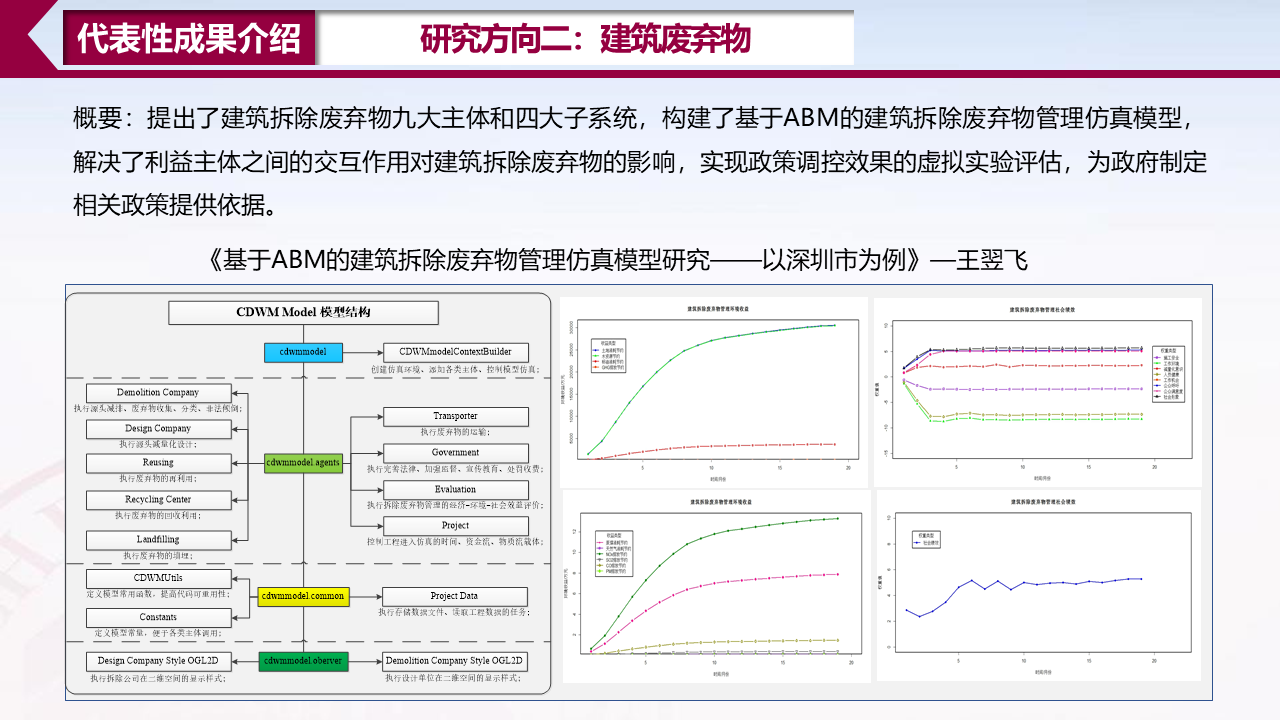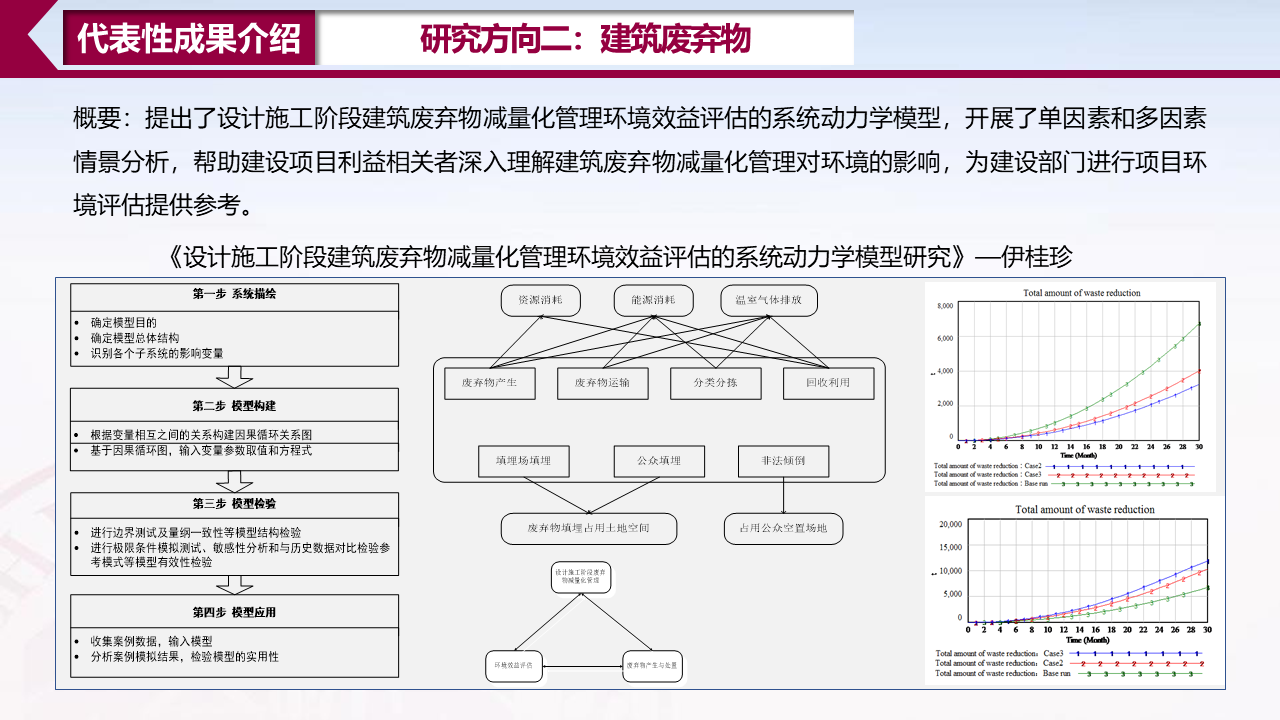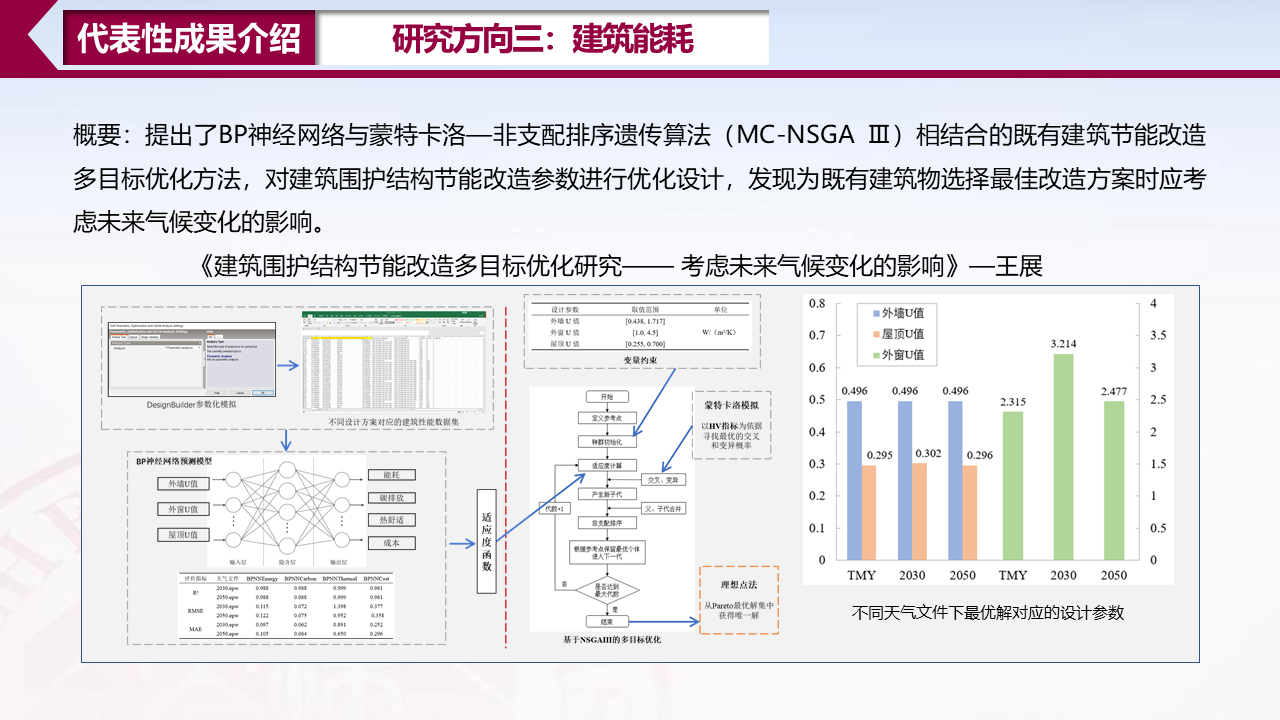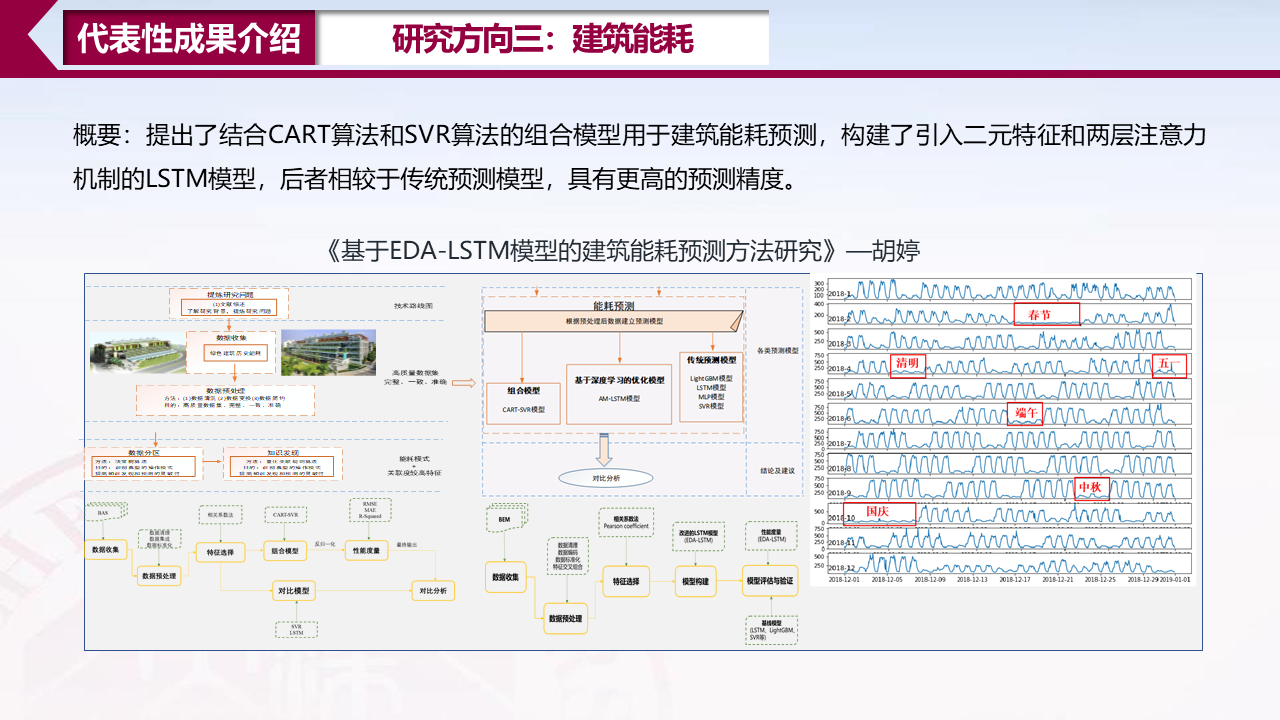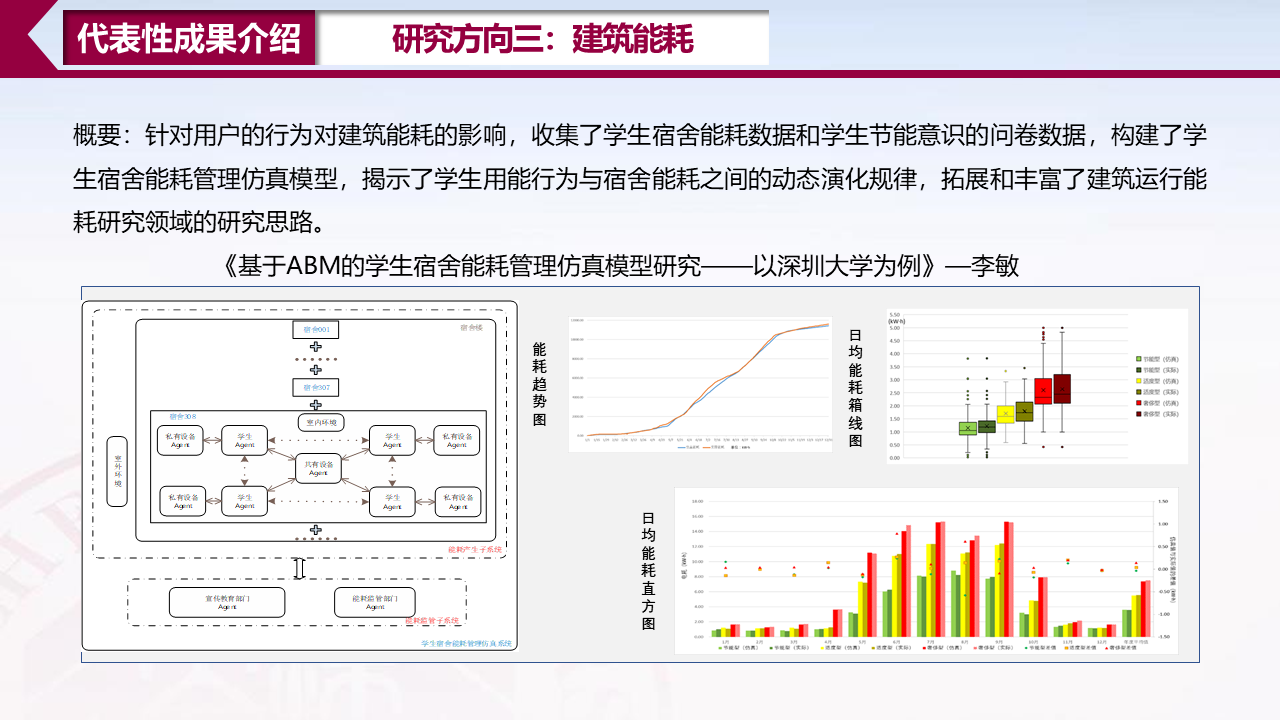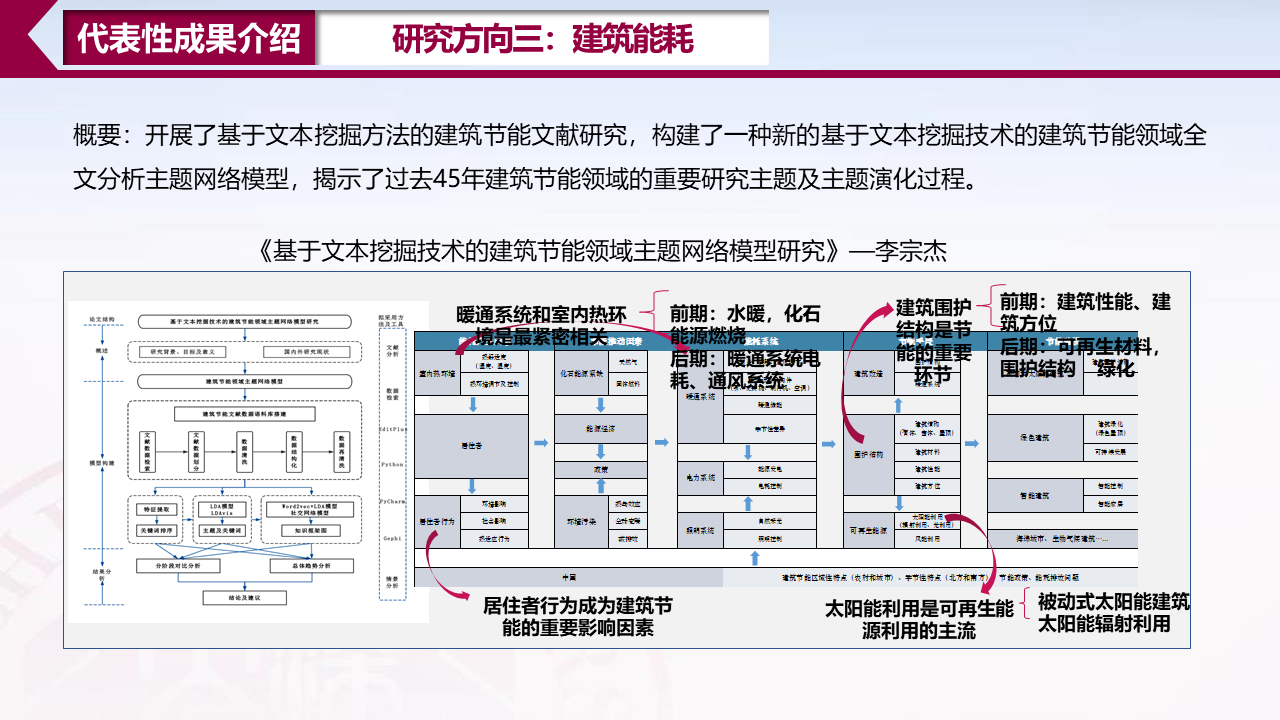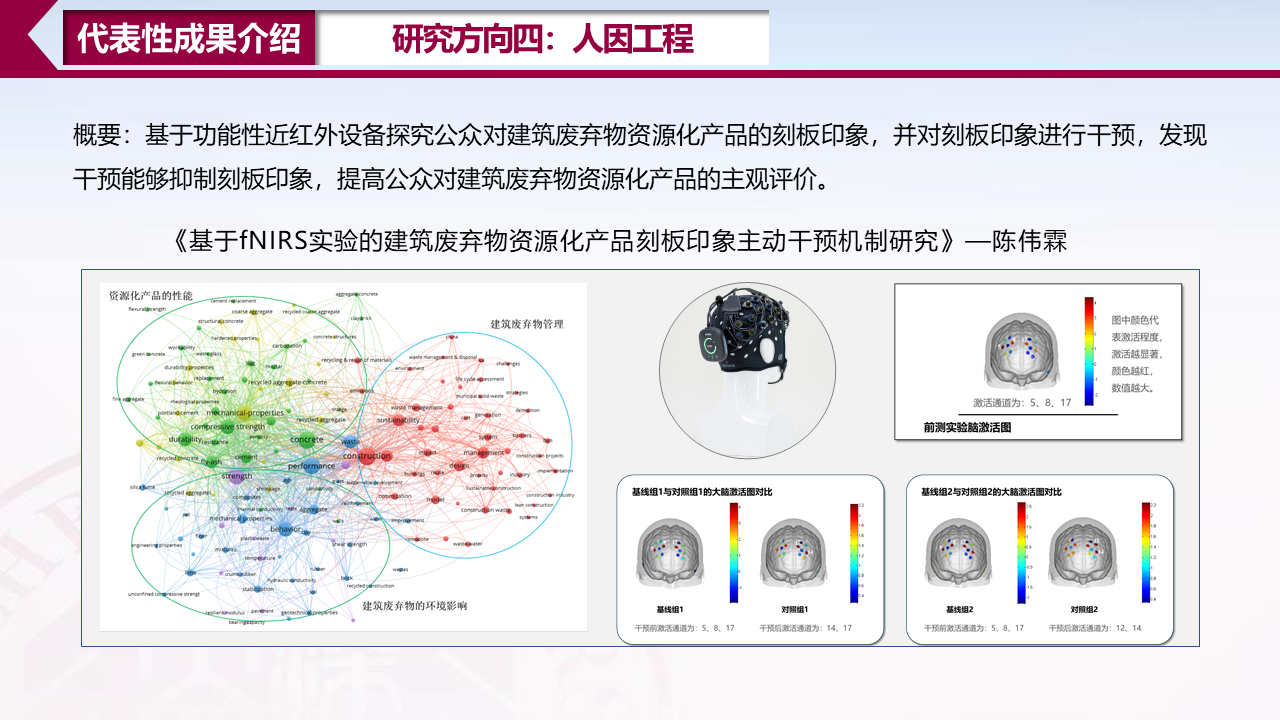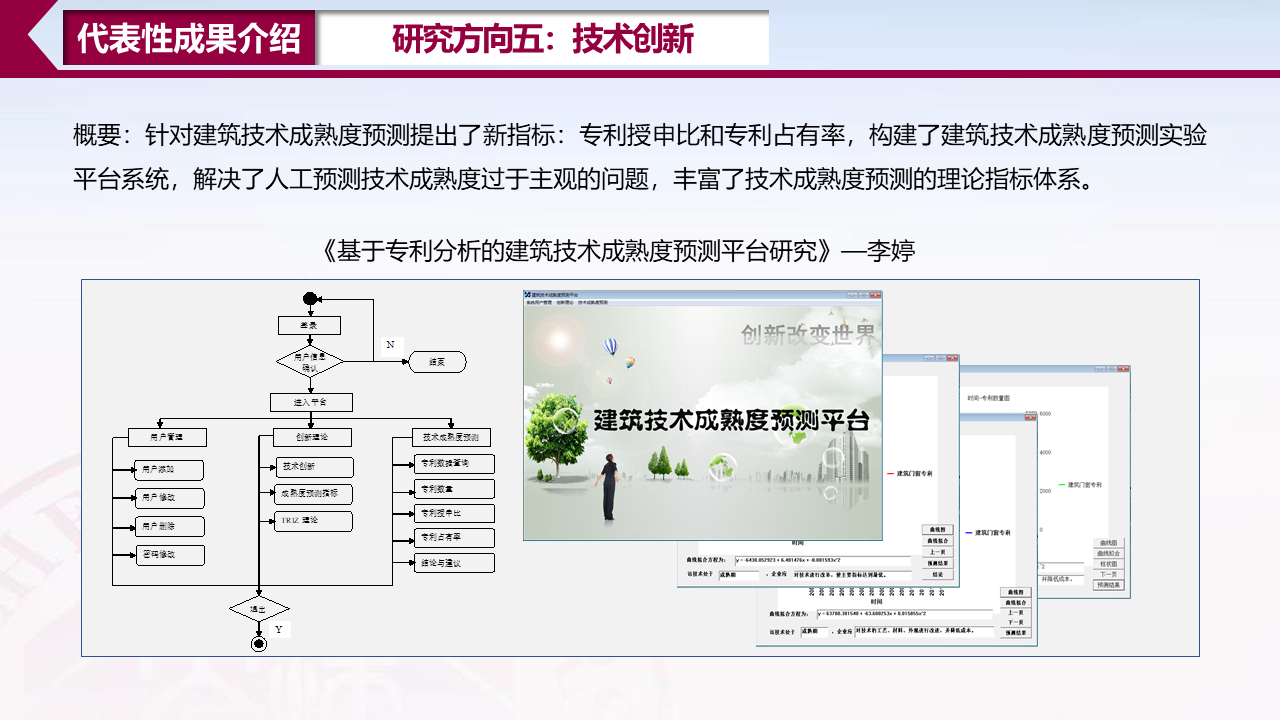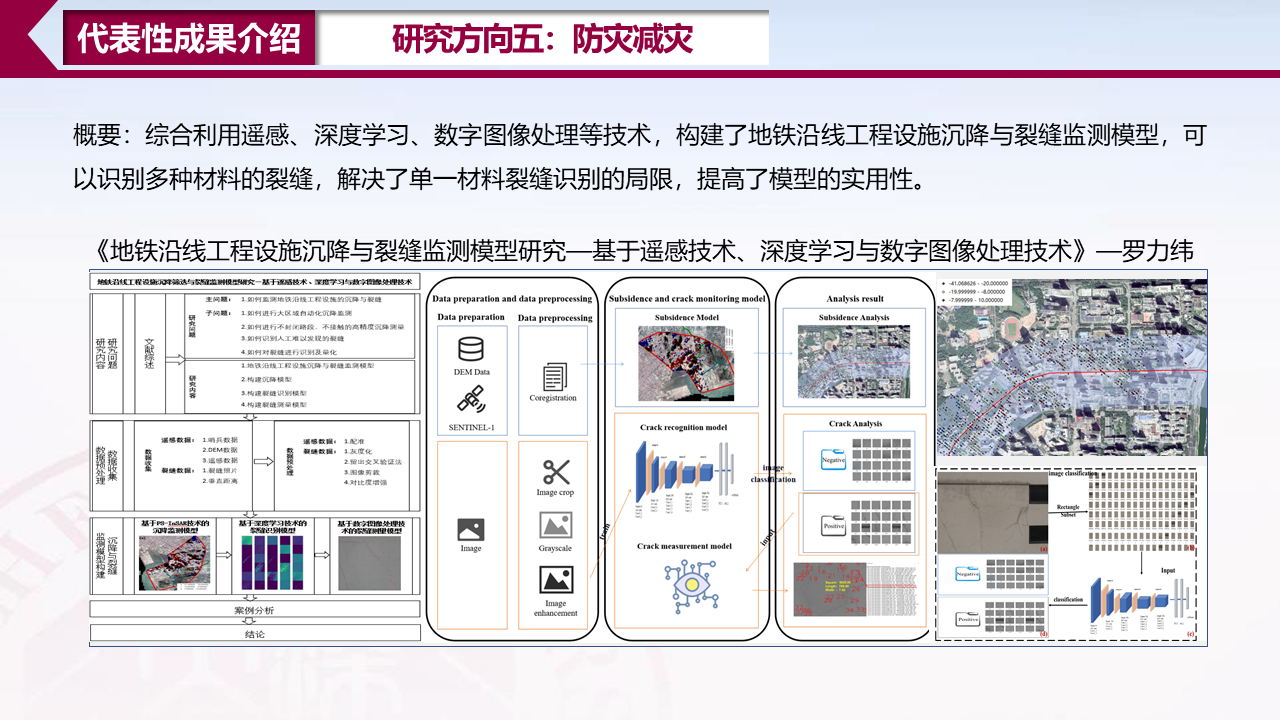
丁志坤
研究中心副主任
教授、博士研究生导师
深圳大学土木与交通工程学院建设管理与房地产系主任
广东省BIM产业技术创新联盟副理事长
深圳市建筑智能与信息化专业委员会委员
深圳市绿色建筑协会专家委员会委员
福田区博士交流协会理事
中华建设管理研究会常务理事、副秘书长
中国图学学会第七届理事会BIM专业委员会委员
学历:博士
毕业院校:香港大学
主要研究方向:建筑信息模型(BIM)、建筑废弃物、建筑节能减排、人因工程
个人简介:
深圳大学长聘教授,博士生导师,首批深圳大学新锐硕士生导师、澳大利亚斯威本技术大学校外博导,深圳市孔雀计划海外高层次人才、后备级人才、南山区领航人才,博士毕业于香港大学,目前担任深圳大学土木与交通工程学院建设管理与房地产系主任;深圳大学中澳BIM与智慧建造联合研究中心副主任;管理科学与工程(工学)一级学科硕士点负责人。获得各类课题15项,发表论文67余篇,专著5部,专利1项,软著7项。
一、近十年项目情况
1.纵向课题
[1] 国家自然科学基金面上项目,城市建筑废弃物利益相关主体资源化决策机制与柔性管理策略仿真实验研究,在研.
[2] 广东省自然科学基金面上项目,基于混合仿真实验的城市建筑废弃物管理动态演化机理与政策调控分析.
[3] 国家自然科学青年基金项目,工程项目建筑废弃物综合管理计算实验研究:动态演化机理与政策调控分析,结题.
[4] 教育部人文社科青年基金,基于知识管理与仿真的技术创新团队认知机理与实验研究,结题.
[5] 深圳市计划基础研究项目,基于BIM的建筑业碳排放计量关键技术研究:以新兴的装配式住宅为例,结题.
[6] 深圳市自然科学基金,深圳“无废城市”试点背景下建筑废弃物智慧管理关键技术研究,在研.
[7] 建设部项目-建设部研究开发项目,建筑废弃物减排中二氧化碳减排量指标体系及精算模型研究,结题.
[8] 建设部项目-建设部研究开发项目,中国建筑废弃物防治管理的行为理论模型研究,结题.
[9] 深圳大学人文社会科学青年扶持项目,城市建筑废弃物收纳场选址研究:以深圳市为例.
2.横向课题
[1] 北京经纬信息技术有限公司,施工工点模型创建服务,在研.
[2] 华润水泥技术研发有限公司,人造石花色图像识别关键技术研究,在研.
[3] 中国建筑一局(集团)有限公司,深圳市城市轨道交通13号线二期(北延)工程土建四工区隧道施工盾构渣土处理碳减排研究工程,在研.
[4] 中南大学,盾构穿越高强度预应力管桩群处理方案研究,结题.
[5] 深圳市监理工程师协会,《深圳市建设工程安全生产监理工作指引》,结题.
[6] 深圳市住房和建设局,深圳市工程监理行业转型升级研究,结题.
二、代表性论文发表情况
1.研究方向一:工程信息化
[1] 丁志坤, 徐盛取, 王家远, 王展, 孙梓桓. 新基建背景下城市基础设施逆向BIM建模研究——以地铁项目为例, 第七届全国BIM学术会议, 2021/11/27-2021/11/28, pp.277-282, 中国重庆, 2021, 会议论文.
[2] Ding Zhikun, Zheng Kairui, Tan Yi. BIM research vs BIM practice: a bibliometric-qualitative analysis from China [J]. Engineering, Construction and Architectural Management, 2021, SCI(Q2), 期刊论文.
[3] Rongsheng Liu, Zhikun Ding. Solving BIM Data Interoperability Problem by Game Theory: From Perspective of BIM Software Developers, 24rd International Symposium on Advancement of Construction Management and Real Estate (CRIOCM 2019), 2019/11/29-2019/12/02, pp.1243-1256, 中国重庆, 2021, 会议论文.
[4] Niu Jindi, Ding Zhikun. A BIM Based Digital Framework for Hotel Renovation Projects: An Integrated Application of 3D Scanning and Prefabrication Technology, 24rd International Symposium on Advancement of Construction Management and Real Estate (CRIOCM 2019), 2019/11/29-2019/12/02, pp.1115-1126, 中国重庆, 2021, 会议论文.
[5] Zhikun Ding, Liwei Luo,Kairui Zheng. A scientometric analysis of BIM and GIS research, 24rd International Symposium on Advancement of Construction Management and Real Estate (CRIOCM 2019), 2019/11/29-2019/12/02, pp.1189-1208, 中国重庆, 2021, 会议论文.
[6] Xu Shengqu, Zhikun Ding, Wen Xinping, Wang Zhan, Zhang Zhiyu. Science mapping of BIM-based automated compliance checking studies:A bibliometric approach, 26rd International Symposium on Advancement of Construction Management and Real Estate (CRIOCM 2021), 2021/11/20-2021/11/22, 中国北京, 会议论文.
[7] Zhikun Ding, Zongjie Li,Ting Hu. Text Mining Based Exploration of Smart City Building Development, 23rd International Symposium on Advancement of Construction Management and Real Estate (CRIOCM 2018), 2018/08/24-2018/08/27, pp.694-709, 中国重庆, 2021, 会议论文.
[8] Ding Zhikun, Liu Shan, Luo Liwei, Liao Longhui. A building information modeling-based carbon emission measurement system for prefabricated residential buildings during the materialization phase [J]. Journal of Cleaner Production, 2020, 264, EI,SCI(Q1), TOP期刊论文.
[9] Ding Zhikun, Niu Jindi, Liu Shan, Wu Huanyu, Zuo Jian. An approach integrating geographic information system and building information modelling to assess the building health of commercial buildings [J]. Journal of Cleaner Production, 2020, 257, EI,SCI(Q1), TOP期刊论文.
[10] 丁志坤, 罗力纬, 谭毅, 张良, 高子斌. IPD模式下BIM驱动的抽水蓄能电站数字化建设框架-以某水电站为例, 第六届全国BIM学术会议, 2020/11/06-2020/11/08, pp.300-307, 中国山西太原, 2020, 会议论文.
[11] 丁志坤, 郑慨睿, 罗力纬, 刘榕昇. 基于数字孪生与物联网技术的火灾智能应急系统框架研究, 第六届全国BIM学术会议, 2020/11/06-2020/11/08, pp.157-162, 中国山西太原, 2020, 会议论文.
[12] 吴凌壹, 丁志坤, 隋莉莉, 王家远. 土木工程BIM实验室的建设与实践教学实施 [J]. 实验技术与管理, 2019, 36(02), pp.194-197+203, 2019, 中文核心期刊论文.
[13] Ding Zhikun, Liu Shan, Liao Longhui, Zhang Liang. A digital construction framework integrating building information modeling and reverse engineering technologies for renovation projects [J]. Automation in Construction, 102, pp.45-58, 2019, EI,SCI(Q1), TOP期刊论文.
[14] 丁志坤, 刘珊, 姜雪影. 基于BIM技术的装配式住宅碳排放计量研究 [J]. 建设管理研究, 1, pp.104-113, 2018, 期刊论文.
[15] 丁志坤, 刘珊, 王家远. BIM数据交换的新范式:P-BIM实施方式及应用案例研究 [J]. 建设管理研究, 1, pp.35-45, 2018 ,期刊论文 .
[16] Ding Zhikun, Jiang Shuanglong, Ng Fungfai, Zhu Menglian. A new TRIZ-based patent knowledge management system for construction technology innovation [J]. Journal of Engineering, Design and Technology, 2017, 15(4), pp.456-470, 2017, EI, 期刊论文.
[17] Ding Zhikun, Zuo Jian, Wu Jinchuang. Key factors for the BIM adoption by architects: A China Study [J]. Engineering, Construction and Architectural Management, 2015, 22(6), pp.732-748, EI, 期刊论文.
[18] Ding Zhikun, Wang Jiayuan, Ng Fungfai. Innovation and patent knowledge management in the construction industry [M]//WANG J Y, DING Z K, ZOU L, et al. Proceedings of the 17th international symposium on advancement of construction management and real estate. Shenzhen, China; Springer., pp.833-842. EI, 2014 会议论文.
[19] Ding Zhikun, Jiang Shuanglong, Wu Jinchuang. Research on construction technology innovation platform based on TRIZ [M]//WEN Z, LI T. The Eighth International Conference on Intelligent Systems and Knowledge Engineering. Shenzhen; Springer. DOI:10.1007/978-3-642-54930, 2013. EI,SCI, 会议论文.
2.研究方向二:建筑废弃物
[1] DING Z, WEN X, CAO X, et al. 2022. A GIS and hybrid simulation aided environmental impact assessment of city-scale demolition waste management. Sustainable Cities and Society [J], 86: 104108,SCI(Q2),期刊论文.
[2]Ding Zhikun, Cao Xiaoyan, Wang Yifei, Wu Huanyu, Zuo Jian, Zillante George. Cost-benefit analysis of demolition waste management via agent-based modelling: A case study in Shenzhen[J]. Waste Management, 137, pp.169-178. 2022, EI,SCI(Q1), TOP期刊论文.
[3]Ding Zhikun, Nie Wanqi, Wu Huanyu. Investigating the connection between stakeholders' purchase intention and perceived value of construction and demolition waste recycled products[J]. Environment Development and Sustainability: 19,2021, EI,SCI(Q2), 期刊论文.
[4]Ding Zhikun, Liu Rongsheng, Yuan Hongping. A text mining-based thematic model for analyzing construction and demolition waste management studies[J]. Environmental Science and Pollution Research, 28(24), pp.30499-30527. 2021, EI,SCI(Q2), 期刊论文.
[5]Ding Zhikun, Liu Rongsheng, Wang Yifei, Tam Vivian WY., Ma Mingxue. An agent-based model approach for urban demolition waste quantification and a management framework for stakeholders[J]. Journal of Cleaner Production, 285, pp.15. 2021, EI,SCI(Q1), TOP期刊论文.
[6] Shi Mengjie, Ding Zhikun. (2021). Zero Construction and Demolition Waste Management Practice: A Case Study in Shenzhen, China. In: Ye, G., Yuan, H., Zuo, J. (eds) Proceedings of the 24th International Symposium on Advancement of Construction Management and Real Estate. CRIOCM 2019. Springer, Singapore.
[7] Nie Wanqi, Ding Zhikun. (2021).The Perceived Value Scale Development for Recycled C&D Waste Products. In: Lu, X., Zhang, Z., Lu, W., Peng, Y. (eds) Proceedings of the 25th International Symposium on Advancement of Construction Management and Real Estate. CRIOCM 2020. Springer, Singapore.
[8] Cao Xiaoyan, Ding Zhikun. (2021). Management of Municipal Construction Waste Transportation by Integrating ABM and GIS Model: A Case Study of Shenzhen. In: Lu, X., Zhang, Z., Lu, W., Peng, Y. (eds) Proceedings of the 25th International Symposium on Advancement of Construction Management and Real Estate. CRIOCM 2020. Springer, Singapore.
[9] Ding Zhikun, Wen Xinping, Xu Shengqu, Zhang Zhiyu, Wang Zhan. An In-Depth Case Study on the Residential Second Renovation Waste in Shenzhen, China, 26rd International Symposium on Advancement of Construction Management and Real Estate (CRIOCM 2021), 2021/11/20-2021/11/22, 中国北京, 会议论文.
[10] Ding Zhikun, Zhu Menglian, Wu Huanyu, Zuo Jian. Information system with multiple data layer approach to select the C&D waste landfilling infrastructure[J]. Environmental Science and Pollution Research, 27(31), pp.38788-38804. 2020, EI,SCI(Q2), 期刊论文.
[11] Ding Zhikun, Gong Wenyan, Fan Ze, Tam, Vivian W. Y., Illankoon, I. M. Chethana S.. Agent-based modelling for environmental impact of renovation waste in Shenzhen, China[J]. Proceedings of the Institution of Civil Engineers-Engineering Sustainability, 173(8), pp.397-413, 2020, EI,SCI(Q4),期刊论文.
[12] Ding Zhikun, Shi Mengjie, Lu Chen, Wu Zezhou, Chong dan, Gong Wenyan. Predicting Renovation Waste Generation Based on Grey System Theory: A Case Study of Shenzhen[J]. Sustainability, 11(16), pp.13. 2019, EI,SCI(Q2), 期刊论文.
[13] Ding Zhikun, Hu Ting, Li Min, Xu Xiaoxiao, Zou Patrick X. W.. Agent-based model for simulating building energy management in student residences[J]. Energy and Buildings, 198, pp.11-27. 2019, EI,SCI(Q1), TOP期刊论文.
[14] Ding Zhikun, Gong Wenyan, Tam Vivian W. Y., Illankoon, I. M. Chethana S.. Conceptual framework for renovation waste management based on renovation waste generation rates in residential buildings: An empirical study in China[J]. Journal of Cleaner Production, 228, pp.284-293, 2019, EI,SCI(Q1), TOP期刊论文.
[15] Ding Zhikun, Fan Ze, Tam Vivian, Bian Yu, Li Shenghan, Illankoon I.M. Chethana S, Moon Sungkon. Green building evaluation system implementation[J]. Building and Environment, 133, pp.32-40, 2018, EI,SCI(Q1), TOP期刊论文
[16] Ding Zhikun, Zhu Menglian, Tam Vivian, Yi Guizhen, Tran Cuong N.N. A system dynamics-based environmental benefit assessment model of construction waste reduction management at the design and construction stages[J]. Journal of Cleaner Production, 176, pp.676-692, 2018, EI,SCI(Q1), TOP期刊论文.
[17] Ding Zhikun, Gong Wenyan, Li Shenghan, Wu Zezhou. System Dynamics versus Agent-Based Modeling: A Review of Complexity Simulation in Construction Waste Management [J]. Sustainability, 10(7), pp.2484-2497, 2018, SCI(Q2), 期刊论文.
[18] Ding Zhikun, Zhu Menglian, Wu Zezhou, Fu Yanbin. Liu Xia. Combining AHP-Entropy approach with GIS for construction waste landfill selection: A case study of Shenzhen [J]. International Journal of Environmental Research and Public Health, 15, pp.2254-2275, 2018, EI,SSCI(Q2), 期刊论文.
[19] Ding Zhikun, Li Min, Li Shenghan. An agent based modeling of building demolition waste sustainable management [M]//WANG Y, PANG Y, SHEN G Q P. International Conference on Construction & Real Estate Management. Guangzhou, Guangdong Province, People's Republic of China, pp. 354-366, 2017, EI, 会议论文.
[20] Ding Zhikun, Gong Wenyan, Wang Yifei, Zou Patrick, X.W., Wang Yanqing. ABM-based environmental performance simulation study of demolition waste management policies in Shenzhen, China [M]//ZOU P X W, SANJAYAN J, ALAM M. Proceedings of 22nd International Conference on Advancement of Construction Management and Real Estate. Melbourne, Australia. pp. 835-850, 2017, 会议论文.
[21] Ding Zhikun, Wang Yifei, Zou Xiaowei. An agent based environmental impact assessment of building demolition waste management: Conventional versus green management [J]. Journal of Cleaner Production, 133, pp.1136-1153, 2016, EI,SCI(Q1), 期刊论文.
[22] Ding Zhikun, Yi Guizhen, Tam Vivian, Huang Tengyue. A system dynamics-based environmental performance simulation of construction waste reduction management in China [J]. Waste Management, 51, pp.130-141, 2016, EI,SCI(Q1), 期刊论文.
[23] Ding Zhikun, Wang Yifei, Wu Jinchuang. CAS and ABM-based demolition waste management research in the AEC industry [J]. Frontiers of Engineering Management, 3(1), pp.18-23, 2016, 期刊论文.
[24] Ding Zhikun, Zhu Menglian, Wang Yifei, Zhu Jiasong. An AHP-GIS based model of C&D waste landfill site selection: a triangulation of critical factors (Merit paper) [C]//LU W. The 21st International Symposium on Advancement of Construction Management and Real Estate. 2016/12/14-2016/12/17, pp.163-174, Hong Kong, China, 获专业权威国际会议优秀论文奖.
[25] 丁志坤,王翌飞,吴金闯. 基于ABMS的智慧城市建筑废弃物综合管理系统仿真研究 [J]. 土木工程与管理学报, 33(3), pp.40-46, 2016, 中文核心期刊论文.
[26] 丁志坤,伊桂珍,黄腾跃. 建筑废弃物减量化管理环境效益评估的系统动力学模型研究 [J]. 防灾减灾工程学报, 36(1),pp.99-106, 2016, CSCD.
[27] 丁志坤, 高宇, 林菁, 郑素玲. 建筑垃圾再利用相关专利技术创新规律探索研究 [J]. 建筑技术, 47(1), pp.82-85, 2016, 中文核心期刊论文.
[28]Ding Zhikun, Wang Yifei, Wu Jinchuang. ABM based system simulation research on construction waste management (Distinction paper) [C]//WU Y. The 20th International Symposium on Advancement of Construction Management and Real Estate. 2015/10/23-2015/10/25, pp.465-476, Hangzhou, China, EI, 获专业权威国际会议杰出论文奖.
[29] 丁志坤, 王翌飞, 吴金闯. 基于CAS和ABM的建筑拆除废弃物管理研究,2015中国工程管理论坛, 2015/5/15-2015/5/18, pp.336-340, 广州, 2015, 会议论文.
[30] 丁志坤, 王翌飞, 吴金闯. 复杂适应系统视角下的城市建筑废弃物管理仿真研究, 工程管理学报, 29(6), pp.48-53, 2015, 期刊论文.
[31] 丁志坤, 伊桂珍, 黄腾跃. 基于系统动力学的智慧城市建筑废弃物减量化管理综合评价研究, 深圳大学第三届荔研论坛, 2015/10/31-2015/11/1, pp.87-97, 深圳, 2015, 会议论文.
[32] Ding Zhikun, Wang Yifei, Wang Hongtao, Wang Jiayuan. A comparison study of C&D waste management in Shenzhen and Hong Kong: A SWOT perspective, The 19th International Symposium on the Advancement of Construction Management and Real Estate, 2014/11/7-2014/11/9, pp.157-168, 重庆, 2014, EI, 会议论文.
[33] 丁志坤, 王翌飞, 吴金闯. 基于复杂性科学理论的建筑拆除废弃物管理研究及大数据时代研究展望, 荔研论坛2014-大数据时代与城市治理, 2014/11/1-2014/11/2, pp.63-71, 深圳, 2014, 分组报告, 会议优秀论文.
[34] Ding Zhikun, Wu Jinchuang, Wang Jiayuan, Wang Hongtao. A new horizon for construction waste management research from a complex adaptive system perspective, Proceedings of the 18th International Symposium on Advancement of Construction Management and Real Estate, 2013/10/18-10/20, pp.581-592, 西安, 2013, EI, 会议论文.
3.研究方向三:建筑能耗
[1] Ding Zhikun, Chen Weilin, Hu Ting, Xu Xiaoxiao. Evolutionary double attention-based long short-term memory model for building energy prediction: Case study of a green building[J]. Applied Energy, 288, pp.14, 2021, EI,SCI(Q1), TOP期刊论文.
[2] Hu Ting, Ding Zhikun. (2021). An Integrated Prediction Model for Building Energy Consumption: A Case Study. In: Ye, G., Yuan, H., Zuo, J. (eds) Proceedings of the 24th International Symposium on Advancement of Construction Management and Real Estate. CRIOCM 2019. Springer, Singapore.
[3] Ding Zhikun, Niu Jindi, Liu Shan, Wu Huanyu, Zuo jian. An approach integrating geographic information system and building information modelling to assess the building health of commercial buildings[J]. Journal of Cleaner Production, 257, pp.18, 2020, EI,SCI(Q1), TOP期刊论文.
[4] Ding Zhikun, Liu Shan, Luo Liwei, Liao Longhui. A building information modeling-based carbon emission measurement system for prefabricated residential buildings during the materialization phase[J]. Journal of Cleaner Production, 264, pp.18, 2020, EI,SCI(Q1), TOP期刊论文.
[5] Ding Zhikun, Liu Rongsheng, Li Zongjie, Fan cheng. A Thematic Network-Based Methodology for the Research Trend Identification in Building Energy Management[J]. Energies, 13(18), pp.33. 2020, EI,SCI(Q3),期刊论文.
[6] Zhu Jiaolan, Zou Patrick X. W, Wang Jiayuan, Ding Zhikun. The Characteristics of Group-Level Energy Behaviors in Buildings[C]// Construction Research Congress 2020, 2020, EI, 会议论文.
[7] Wang Jiayuan, Zhu Jiaolan, Ding Zhikun, Zou Patrick X. W., Li Jie. Typical energy-related behaviors and gender difference for cooling energy consumption[J]. Journal of Cleaner Production, 238, pp.15, 2019, EI,SCI(Q1), TOP期刊论文.
[8] Ding Zhikun, Zhu Menglian, Wu Zezhou, Fu Yanbin, Liu Xia . Combining AHP-Entropy Approach with GIS for Construction Waste Landfill Selection-A Case Study of Shenzhen[J]. International Journal of Environmental Research and Public Health, 15(10), pp.21, 2018, EI,SCI(Q3),期刊论文.
[9] Ding Zhikun, Li Zongjie, Fan Cheng. Building energy savings: Analysis of research trends based on text mining [J]. Automation in Construction, 96, pp.398-410, 2018, EI,SCI(Q1), TOP期刊论文.
4.研究方向四:工程管理
[1] Ding Zhikun, Wang Jiayuan, Zuo Jian, Gong Wenyan. Key performance indicators for regional construction supervision systems in China [J]. Engineering management journal, 29(3) pp.179-188, 2017, EI,SSCI(Q4),SCI(Q4), 期刊论文.
[2] Ding Zhikun, Zuo Jian, Wang Jiayuan, Zillante George. Searching for niche market for engineering consultants: case of regional supervision systems in China [J]. Engineering, Construction and Architectural Management, 23(5), pp.622-37, 2016, EI, 期刊论文.
[3] Ding Zhikun, Ng Fungfai, Li Jingru. A parallel multiple mediator model of knowledge sharing in architectural design project teams [J]. International Journal of Project Management, 32(1), PP.54-65. 2014, EI,SSCI(Q1), 期刊论文.
[4] Ding Zhikun, Ng Fungfai, Wang Jiayuan. Testing trust scale measurement invariance in project teams [J]. Journal of Engineering, Design and Technology, 12(2), pp.209-222, 2014, EI, 期刊论文.
[5] Ding Zhikun, Wang Jiayuan, Ng Fungfai. Innovation and patent knowledge management in the construction industry [M]//WANG J Y, DING Z K, ZOU L. Proceedings of the 17th international symposium on advancement of construction management and real estate. Shenzhen, China; Springer. pp. 833-842, 2014, 会议论文.
[6] Ding Zhikun, Ng Fungfai, Wang Jiayuan. The mediation role of trust in knowledge sharing: A cognitive perspective in Chinese architectural design teams [J]. Engineering, Construction and Architectural Management, 20(6), pp. 604-619, 2013, EI期刊论文.
[7] Ding Zhikun, Ng Fungfai, Wang Jiayuan, Zou Liang .The distinction between team-based self-esteem and company-based self-esteem in the construction industry [J]. Journal of Construction Engineering and Management, 138(10), pp.1212-1219. 2012, EI,SCI(Q2), 期刊论文.
[8] Ding Zhikun, Ng Fungfai. Personal construct-based factors affecting interpersonal trust in a project design team [J]. Journal of Construction Engineering and Management, 136(2), pp.227-234, 2010, EI,SCI(Q2), 期刊论文.
[9] Ding Zhikun, Ng Fungfai, Wang Jiayuan. Personal construct based factors affecting willingness to share knowledge between architects in a project design team [J]. International Journal of Construction Management, 10(3), pp.1-11,2010, 期刊论文.
[10] Ding Zhikun, Ng Fungfai. Knowledge sharing in architectural design institutes: a multiple-case study [J]. Journal of Construction Innovation: Information and Process Management, 10(4), pp 267-285, 2010, 期刊论文.
5.研究方向五:人因工程
[1] Chen Weilin., Ding Zhikun*. A Bibliometric Analysis of EEG Based Mental Workload Assessment Research [M]//Lu X., Zhang Z., Lu W., Peng Y,et al. Proceedings of the 25th International Symposium on Advancement of Construction Management and Real Estate. CRIOCM 2020. Springer, Singapore. pp.219-233, 2021. 会议论文.
[2] Zhang Zhiyu, Ding Zhikun*, Chen Weilin. A study of construction workers' danger recognition process based on EEG experiment, 26rd International Symposium on Advancement of Construction Management and Real Estate (CRIOCM 2021), 2021/11/20-2021/11/22, 中国北京, 会议论文.
[3] Ding Zhikun, Zhang Zhiyu, Chen Weilin, The Influence of Media in Purchasing Decisions for Recycled Construction and Demolition Waste Products: An Functional Near Infrared Spectroscopy Study. FRONTIERS IN NEUROSCIENCE, 2022. 16. SCI(Q2), 期刊论文.
三、代表性专利情况
[1] 整体式伸缩脚手架,CN203097248U,曹珑畅,丁志坤,许庆光,李燕萍
四、代表性软件著作权
1.研究方向一:建筑信息化模型
[1] 基于语义映射的BIM模型智能审查系统V1.0,2022SR1013838,丁志坤,徐盛取
[2] 广厦慧宇(Android)版App软件V1.0,2020SR0796869,丁志坤,牛金棣
2.研究方向二:建筑废弃物
[1] 建筑废弃物管理混合仿真实验平台V1.0,2020SR0887811,丁志坤,施梦婕
[2] 装饰装修废弃物管理仿真系统实验平台V1.0,2018SR622781,丁志坤,龚文艳
3.研究方向三:建筑能耗
[1] 高校宿舍能耗管理仿真系统实验平台V1.0,2018SR624895,丁志坤,李敏
4.研究方向四:技术创新
[1] 技术创新与成熟度预测实验平台系统V1.0,2016SR036012,丁志坤,李婷
[2] 技术创新实验平台系统V1.0,2014SR114295,丁志坤,江双龙
五、代表性著作情况
1.研究方向一:建筑信息化模型(BIM)
[1] 《Autodesk Revit Architecture 2016官方标准教程》,电子工业出版社,2016-07-01
2.研究方向二:建筑废弃物管理
[1] 《建筑废弃物减排技术规范》,王家远,米旭明,刑峰,陈曼文,邹涛,李景茹,丁志坤,中国建筑工业出版社,2011-01-01
3.研究方向三:工程管理
[1] 《深圳市建筑工程安全生产管理监理服务手册》,王家远,王刚,丁志坤,蒋卫平,中国建筑工业出版社,2015-01-01
[2] 《Proceedings of the 17th international symposium on advancement of construction management and real estate》,Springer,2012-01-01
[3] 《深圳市工程监理行业发展蓝皮书》,中国建筑工业出版社,2010-01-01
六、代表性成果介绍
